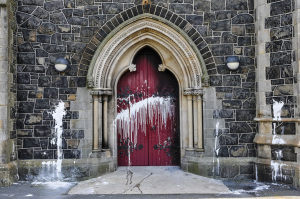Biden admin. may partially repeal rule protecting Christian student groups at universities

The Biden administration is reviewing a federal rule that prohibits public universities and colleges from, among other things, removing the funding of religious student organizations whose leadership policies conflict with campus anti-discrimination rules.
The U.S. Department of Education posted a blog entry last Thursday written by Acting Assistant Secretary for Office of Postsecondary Education Michelle Asha Cooper, announcing a review of the "Free Inquiry Rule."
“Certain aspects of these regulations … impose additional requirements on Department of Education higher education institutional grant recipients,” wrote Cooper.
“The Department is currently conducting a review of those regulations while keeping in mind the importance of several key elements, including First Amendment protections, nondiscrimination requirements, and the promotion of inclusive learning environments for all students.”
In November 2020, the Trump administration passed a final rule centered on protecting the rights of religious student groups at public colleges and universities. The rule, known as the “Improving Free Inquiry, Transparency, and Accountability at Colleges and Universities” regulation, is also called the “Free Inquiry Rule.”
The rule came partly in response to legal battles centered on Christian student groups facing punishment from public universities for not allowing non-Christians or those who refuse to adhere to biblical sexual ethics to become leaders of their student clubs.
It revised existing regulations “to clarify how educational institutions may demonstrate that a religious organization controls them to qualify for the exemption provided under Title IX, 20 U.S.C. 1681(a)(3), to the extent Title IX or its implementing regulations would not be consistent with the religious tenets of such organization.”
According to the summary of the rule, the regulation was created in response to then-President Donald Trump signing Executive Order 13864 in March 2019, as well as recent litigation regarding student rights.
“These regulations also require a public institution to not deny a religious student organization any of the rights, benefits, or privileges that are otherwise afforded to other student organizations,” stated the summary.
In the blog entry, Acting Assistant Secretary Cooper also wrote that following the review, the Education Department expects to publish “a notice of proposed rulemaking in the Federal Register to propose rescinding parts of the Free Inquiry Rule.”
“Throughout this process and beyond, public colleges and universities must ensure protection of First Amendment freedoms, including religious freedom and freedom of association, which long predate the Free Inquiry Rule,” she continued.
“Compliance with nondiscrimination requirements must be in a manner consistent with the First Amendment. We urge public colleges and universities and their students to engage thoughtfully on these matters ...”
Americans United for Separation of Church and State, which, alongside American Atheists, is challenging the Free Inquiry Rule in court, celebrated the announcement.
“We applaud the Department of Education for its willingness to reconsider this harmful regulation, and for sending the message to colleges, universities and their students that this wrong may soon be righted,” said Richard B. Katskee, vice president and legal director of Americans United, in a statement.
“We anticipate that the Biden administration will agree with us that discrimination has no place in our public colleges and universities — even if religion is used to justify it.”
The Trump-era rule came as several religious student groups filed lawsuits after their universities de-recognized them as official campus groups because their leadership policies required that their leaders be Christian and adhere to their statements of faith.
In April, a federal court sided with InterVarsity Christian Fellowship, which sued Wayne State University after its official student club status was revoked in 2017. Not being recognized as an official club means that the group can't access benefits that campus groups receive, such as reserving meeting rooms for free and applying for campus funding.
Judge Robert H. Cleland of the U.S. District Court for the Eastern District of Michigan ruled that other student groups were allowed to restrict their leadership based on sex, gender identity, political partisanship, ideology, creed, ethnicity, GPA or attractiveness. However, the “small group of Christians ... were denied [student organization] benefits because they require their Christian leaders to be ... Christian.”
Other courts have also ruled in favor of other Christian student groups, including another InterVarsity chapter that filed similar lawsuits against the University of Iowa.
Greg Jao, director of external relations for InterVarsity Fellowship, said in a statement last November that the Trump-era rule was "necessary because some universities would give official recognition only to certain faith-based groups, while rejecting others."
“What made the student groups who were denied recognition different? They expected their student leaders to agree with their religious beliefs," Jao said in a statement. "The recognized groups did not. Universities should welcome all religious groups equally, in order to encourage tolerance, pluralism and religious diversity.”
Ismail Royer, director of the Islam and Religious Freedom Action Team for the Religious Freedom Institute, a supporter of the "Free Inquiry Rule," stated last year that “This new regulation is an important policy for Muslim student organizations because it allows them to select their own leaders and define their own mission by their faith’sprinciples.”
According to Royer, “This right should be reserved for all student religious organizations, and not usurped by university officials based on their own shifting, unpredictable standards.”





























